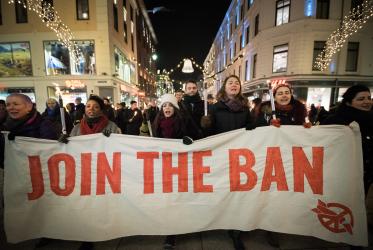On 6 August, a “Joint Interfaith Statement on the 75th Anniversary of the Atomic Bombings of Hiroshima and Nagasaki” was released, reaffirming the existential threat to humanity that nuclear weapons pose.
The interfaith group normally delivers a statement during review conferences of the Non-Proliferation Treaty. However, the postponement of the 2020 conference due to COVID-19 inspired the group to instead develop a common response to the 75th anniversary of the nuclear attacks on Hiroshima and Nagasaki.
The statement is signed by 189 organizations, including the World Council of Churches (WCC).
“As a wide coalition of faith-based communities from around the world, we have committed to speaking with one voice that rejects the existential threat to humanity that nuclear weapons pose,” reads the statement. “We reaffirm that the presence of even one nuclear weapon violates the core principles of our different faith traditions and threatens the unimaginable destruction of everything we hold dear.”
The statement emphasizes that the presence of nuclear weapons undermines the ethical and moral foundations of the common good. “We call for your commitment to a world that is more peaceful, safe, and just—a world only possible with the elimination of nuclear weapons,” reads the statement, which also remembers the hibakusha in Japan, and also the continued suffering of those whose lands and seas were used to test nuclear weapons.
WCC interim general secretary Rev. Prof. Dr Ioan Sauca expressed deep gratitude to the organizations supporting the statement. “The number of different faiths represented confirms that the presence on our planet of weapons of mass destruction, and the absurd notion that they somehow protect humanity, is being increasingly rejected both by Christians and others from a range of diverse faiths all around the globe,” said Sauca. “The World Council of Churches will continue to honour the memory of the many people who have lost their lives to nuclear attacks or from weapons testing, by calling for a world free of all nuclear weapons.”
Emily Welty, vice–moderator of the WCC Commission of the Churches on International Affairs, said the joint statement this year is one of the largest, most diverse interfaith statements on nuclear weapons ever issued.
"We have been joined by groups that range from entire denominations and regional conferences to individual intentional communities; the signatories represent organizations from the Jewish, Christian, Muslim, Jain, Hindu and Buddhist traditions,” said Welty. “Together we pause to recognize the terror of the past, to honor the lives that were sacrificed to the nuclear ambitions of a few and to say in the clearest voice possible – this was wrong and must never happen again.”
The statement concludes with the reminder that in 2017, the world drew closer to complete abolition of nuclear weapons when the UN adopted the Treaty on the Prohibition of Nuclear Weapons. Forty countries have now ratified it, and it will enter into force once 10 more do so.
The statement urges all governments to use the opportunity of the 75th anniversary of the only occasion that nuclear weapons have been used in conflict, to ensure that they are never used again in any circumstances. It urges all States to join the growing community of States which have rejected nuclear weapons entirely by ratifying the Treaty on the Prohibition of Nuclear Weapons.
“WCC calls for disarmament amid remembrance of nuclear attacks on Hiroshima and Nagasaki” – WCC news release 20 July 2020
“WCC to observe 75th anniversary of the nuclear attacks on Hiroshima and Nagasaki” – WCC news release 1 July 2020







